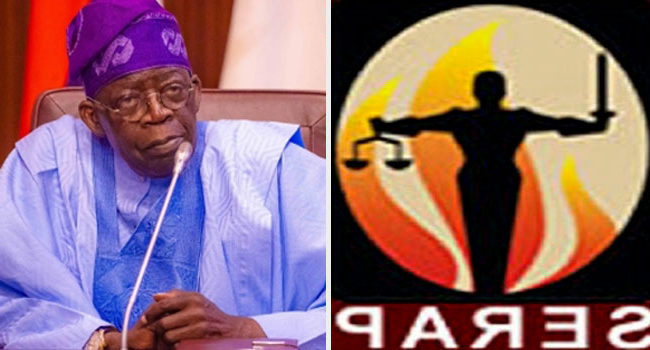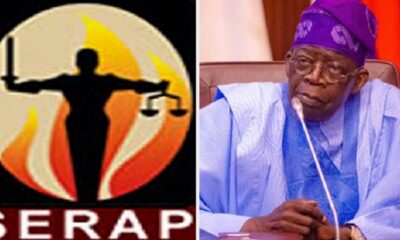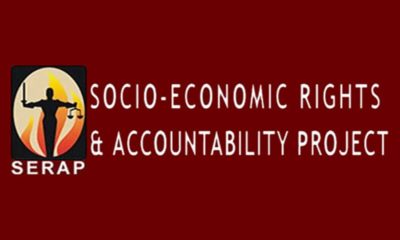NEWS
‘Minimum Wage Bill Must Uphold Workers’ Right To A Living Wage’ – SERAP To Tinubu

The Socio-Economic Rights and Accountability Project (SERAP) has urged President Bola Tinubu to “ensure that his government’s proposed bill on new minimum wage for Nigerian workers is entirely consistent and compatible with Nigeria’s international obligations to promote and advance the right of workers to an adequate living wage.”
Recall that the president had in his Democracy Day Speech on June 12 stated that “We shall soon send an executive bill to the National Assembly to enshrine the new minimum wage as part of our law for the next five years or less.”
In a letter dated 15 June 2024 and signed by SERAP deputy director Kolawole Oluwadare, the organisation said: “the reportedly proposed level of the minimum wage in the executive bill is grossly inadequate and falls short of the requirements of international human rights treaties to which Nigeria is a state party.”
The SERAP said, “The executive bill should reflect the international standards that Nigerian workers should be provided, at a minimum, with a living wage, in accordance with costs of living.”
According to the SERAP, “As you and your government know, Nigerian workers face many human rights challenges. Most of the people living in poverty work, yet they do not earn a wage sufficient to afford an adequate standard of living for themselves and their families.”
The letter, read in part: “Any proposed minimum wage that fails to guarantee a life in dignity for Nigerian workers and their families would be entirely inconsistent and incompatible with international standards.”
“Successive governments have persistently and systematically violated these guarantees. Millions of Nigerian workers remain poor due mainly to low wages and a lack of social security and social protection.”
“If your government sends to the National Assembly any bill which fails to meet the requirements of international standards, and the bill is then passed into law, SERAP shall take all appropriate legal actions to compel your government to comply with our request in the public interest.”
“The proposed recommendations are not unrealistic, as they are based on Nigeria’s international human rights obligations. Human rights are not a matter of charity. Upholding Nigeria’s international obligations regarding the right of workers to an adequate living wage would protect the purchasing power of workers in poverty.”
“The preparation of the executive bill provides you and your government an important opportunity to respect, protect, promote and advance the rights of Nigerian workers to an adequate living wage and fair remuneration.”
“We urge you to take concrete steps to defend the rights of Nigerian workers to an adequate living wage.”
“This would ensure that the proposed executive bill protects not only against absolute poverty but also against relative poverty, as a source of social exclusion.”
“Your government has legal obligations to reflect these guarantees in any executive bill on the new minimum wage to be sent to the National Assembly.”
“The International Covenant on Economic, Social and Cultural Rights imposes clear legal obligations on your government to ensure and uphold the right of Nigerian workers to an adequate living wage that would ensure a decent standard of living for the workers and their families.”
“We urge you to put the country’s resources at the service of human rights, and to advance Nigerian workers’ right to an adequate living wage by immediately cutting the cost of governance and implementing bold transparency and accountability measures in ministries, departments and agencies (MDAs).”
“We urge you and your government to urgently propose cuts in the huge budgetary allocations to fund security votes, jumbo salaries and allowances paid to members of the National Assembly, and unlawful life pensions to former governors and their deputies.”
“We also urge you and your government to immediately and fully recover missing public funds from MDAs, as documented in the several reports published by the Auditor-General of the Federation.”
“These would enable you and your government to effectively comply with Nigeria’s international legal obligations regarding workers’ right to an adequate living wage.”
“Article 27 of the Vienna Convention on the Law of Treaties of 1969, to which Nigeria is a state party provides that ‘[A] party may not invoke the provisions of its internal as justification for its failure to perform a treaty.’”
“The minimum wage setting must take into consideration the relative living standards of other social groups and economic factors, including the requirements of economic development.”
“This means that the level of wages to be proposed in the executive bill takes into account the current cost of living in the country, to ensure that it is sufficient to enable the worker and his or her family to enjoy other rights such as health care, education and an adequate standard of living.”
“SERAP urges you to ensure that the proposed executive bill sets the minimum wage at a level that corresponds to the ‘living wage’, allowing Nigerian workers and their families to achieve an adequate standard of living.”
“We would therefore be grateful if the recommended measures are reflected in the proposed executive bill.”
“According to our information, you stated in your Democracy Day Speech on June 12 2024 that your government is finalising an executive bill on the new minimum wage which is set to be sent to the National Assembly.”
“Under article 23 of the Universal Declaration of Human Rights and article 7 (a) of the International Covenant on Economic, Social and Cultural Rights, all Nigerian workers have the right to a remuneration which provides them, as a minimum, with fair wages and a decent living for themselves and their families.”
“In the preamble of its Constitution, ILO calls for ‘an adequate living wage’, and in the Declaration concerning the aims and purposes of the International Labour Organization, ILO affirms its ‘solemn obligation’ to promote ‘policies in regard to wages and earnings, calculated to ensure a minimum living wage to all employed and in need of such protection’.”
“In article 3 of the Minimum Wage Fixing Convention, 1970 (No. 131), ILO requires that minimum wage setting take into consideration ‘the needs of workers and their families, taking into account the general level of wages in the country, the cost of living, social security benefits.’”
NEWS
Ohanivo Upbeat As Sen Umahi Emerges Silverbird’s Most Outstanding Minister Of The Year

The entire 10 communities of the old Ohaozara Local Government Area, known as Ohanivo, of Ebonyi State have been reverberating with joy, because their illustrious son, the Minister of Works, HE Sen. Engr (Dr) Nweze David Umahi emerged Silverbird’s Most Outstanding Honourable Minister of the Year.
Biztellers reports that Ohanivo is made up of three LGAs, including, Ohaozara, Onicha and Ivo, while the 10 autonomous communities are Uburu, Okposi, Aka Eze, Ishiagu, Isu, Onicha, Ugwulangwu, Ukawu, Abaomege, and Oshiri.
Feelers from the organisers of the glamourous awards, Silverbird Group, assure that plans have been fine-tuned for the annual event, billed for the Eko Hotel and Suites, Victoria Island, Lagos on Sunday.
There are indications that a strong team of community leaders including Chief Kenneth Eze, Uche Umezurike, Okoro Enekwachi, Francis Ekwe, Emma Nwaze, among others would be on ground to cheer the distinguished minister of works as he receives his well-deserved award.
ALSO READ: Edo Women Protest Against Natasha Over Akpabio
In a related development, the Member, House of Representatives, representing Ohaozara/Onicha/Ivo Federal Constituency, Hon. (Dr.) Kama Nkemkanma, has sent his congratulatory message to Sen Umahi.
Hon Nkemkanma’s message reads, “It is with deep pleasure that I convey the profound felicitations of my family and good people of Ohaozara/Onicha/Ivo Federal Constituency to our dear leader and achiever, His Excellency, Sen. Engr (Dr) Nweze David Umahi CON, FNSE, FNATE, GGCEHF, Honourable Minister of Works on his emergence as the Silverbird Most Outstanding Honourable Minister of the Year. Whom the cap fits, let him wear.
“Your Excellency, the initiative of this administration to construct the Renewed Hope four (4) legacy projects and the will power to continue the funding and construction of the inherited on-going projects across the six (6) Geo-political Zones are eloquent testimonies of the commitment of Mr President in unlocking the potentials of every segment of our country and building a regenerative economy for sustainable future. We are proud that you have unmitigated signature in this memory. May God continue to give you the flourishing grace and enablement to always be on top in your endeavours.
“Please accept the assurances of the prayers, solidarity, and esteemed regards of my constituents, always. Once more congratulations.”
NEWS
Kano Gov’t Clarifies Appeal Court Ruling On Emirship Dispute

The Kano State Government has addressed widespread misinterpretations surrounding the recent Court of Appeal judgment on the ongoing emirship dispute, urging the public to rely on accurate legal information.
In a statement issued on Saturday, Governor Abba Yusuf’s spokesman, Sunusi Dawakin-Tofa, clarified the ruling and the government’s position.
READ MORE: JUST IN: Court Of Appeal Orders Retrial In Kano Emirate Dispute
Speaking at a press briefing at the Nigeria Union of Journalists (NUJ) Secretariat in Kano, the state’s Attorney General and Commissioner for Justice, Haruna Dederi, explained that the Court of Appeal’s verdict, delivered on January 10, 2025, upheld the repeal of the Kano Emirate Council Law, 2019, effectively overturning the previous judgment of the Federal High Court, Kano.
However, Dederi noted that Alhaji Aminu Dan’agundi, who was dissatisfied with the ruling, has since filed an appeal at the Supreme Court.
He further stressed that the Appeal Court’s judgment remains binding until the Supreme Court rules otherwise.
Addressing concerns over the stay of execution recently granted by the Court of Appeal, the Attorney General described it as a standard legal procedure intended to maintain the status quo pending the Supreme Court’s final decision.
“The Kano State Government urges the public to remain calm, law-abiding, and avoid any form of provocation,” the statement read.
The government has also directed its legal team to thoroughly review the proceedings and determine the next steps in accordance with the law.
On behalf of the governor, Dederi expressed appreciation to the people of Kano for their patience, understanding, and continuous prayers for peace and progress in the state and the nation.
The emirship dispute has been a topic of intense debate in Kano, with various legal and political implications.
NEWS
Niger Delta Youths Threaten Oil Shutdown Over Rivers Crisis

Tensions are rising in Rivers State as the Niger Delta Youth Council (NDYC) has issued a seven-day ultimatum to President Bola Tinubu, threatening to halt oil production in response to the ongoing political crisis in the state.
In a statement signed by its president, Bene Youkore Mamamu, and made available to journalists in Warri on Saturday, the group listed three key demands: the restoration of Rivers State’s statutory revenue allocation, an end to alleged impeachment moves against Governor Similaye Fubara, and a public retraction of reported anti-Ijaw remarks attributed to former Governor and current FCT Minister, Nyesom Wike.
READ ALSO: BREAKING: Rivers Chief Judge Under Probe For Alleged Age Falsification
The youth group warned of dire economic consequences if their demands were ignored.
“We are ready to shock the world in seven days. The oil that fuels this nation flows from our land, the fourth largest and most populated ethnic group in Nigeria. We will not allow Wike, who we suspect is being used by the Presidency, to sabotage our region and undermine Ijaw history,” the statement read.
The NDYC accused Wike of attempting to manipulate the political landscape of Rivers State and marginalize the Ijaw ethnic group, citing his reported comments describing the Ijaws as a “minority within a minority.”
The group labeled the remarks as “provocative, inflammatory, and a declaration of economic and political war.”
Further criticizing the Federal Government, the NDYC alleged that President Tinubu’s administration was enabling Wike’s interference in Rivers politics.
“We are angry that Tinubu’s government has empowered Wike and the Judiciary to undermine Ijaws and the Niger Delta region, with regular threats to impeach Governor Fubara, seize the state’s allocation, insult late Pa Edwin Clark, and rewrite the history of the Ijaw nation,” the letter continued.
With the deadline fast approaching, the NDYC has called on its members to prepare for action, warning that oil production across the region could be disrupted if their demands are not met.
The potential shutdown poses a serious threat to Nigeria’s economy, given that the Niger Delta remains the country’s primary source of crude oil revenue. A disruption could exacerbate economic challenges, including foreign exchange shortages and rising inflation.


















